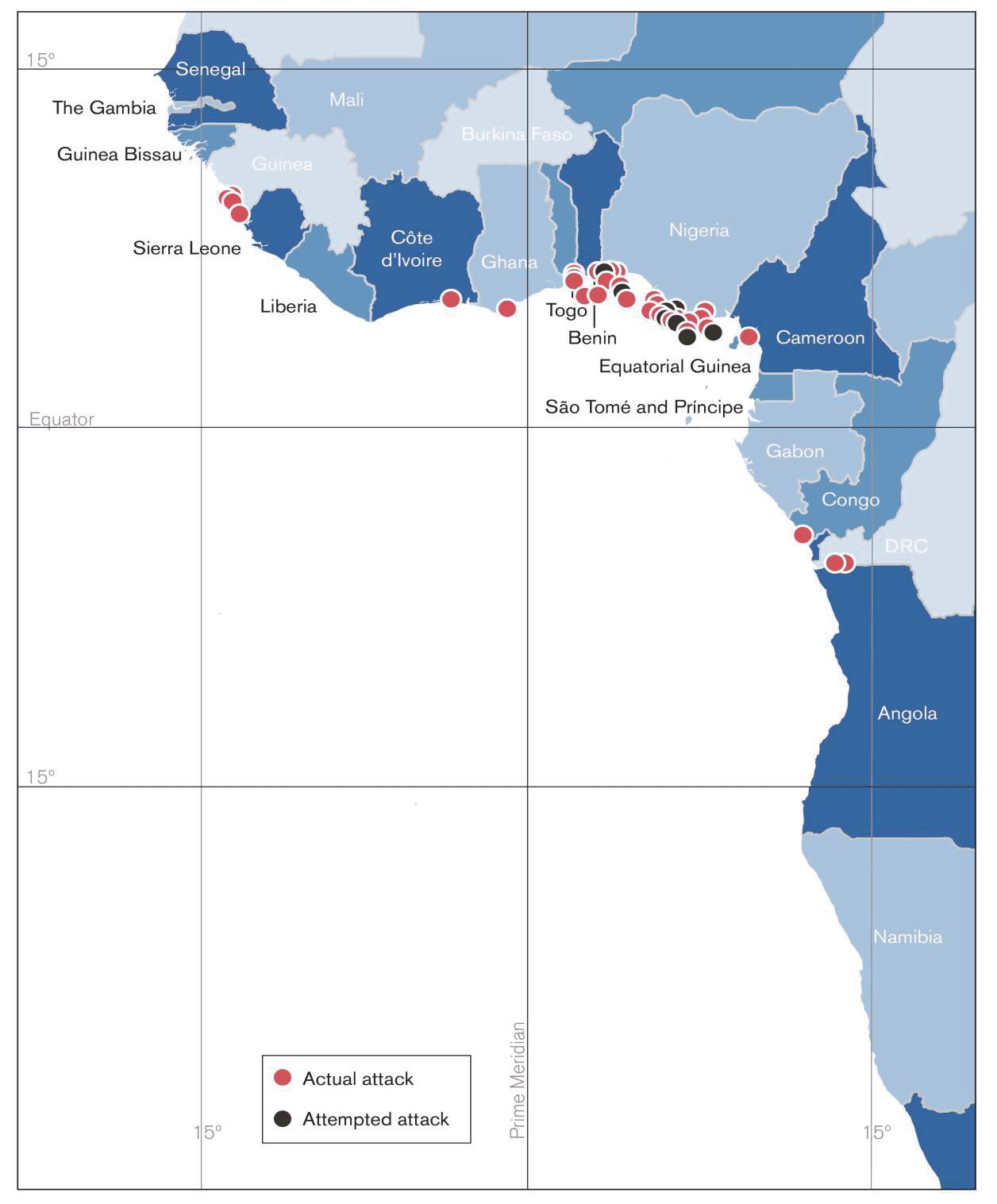Maritime Security in the Gulf of Guinea: Introduction
5 Sep 2013
By Adjoa Anyimadu for Chatham House
Introduction
Piracy emanating from Somalia has dominated maritime security concerns of policy-makers worldwide for the past five years. Sporadic attacks on commercial vessels have occurred close to the coast of Somalia for more than a decade, but in 2008 concerns for the security of the busy shipping routes running across the Indian Ocean and through the Gulf of Aden grew, as the number of successful hijackings, the scope of the pirates’ area of operation and the amount demanded in ransom payments rose dramatically.
The year 2008 also marked the start of concerted and wide-ranging international efforts to counter Somali piracy, and the effects of these initiatives are now evident: in May 2013 UN officials noted that there had been no successful hijacking in the Indian Ocean for a year. [1]
International attention is now shifting to the insecurity of waters off Africa’s west coast.[2] The Gulf of Guinea – the coastal zone stretching from Senegal to Angola – provides an economic lifeline to coastal and landlocked West African countries, and is of strategic importance to the rest of the world. Safe passage to ports in the region and security within its waters are vital for global energy production, as Nigeria and Angola are among the world’s 10 biggest crude oil exporters; for West Africa’s fishing industry, which provides sustenance and employment for a large swathe of the West African population; and for the prevention of the trafficking of narcotics, people and weapons into Europe and into fragile regions that are vulnerable to destabilization. In June 2013 the annual Human Cost of Maritime Piracy report noted that more seafarers were attacked in West African waters than off Somalia’s coast in 2012.[3]
Although maritime organizations, most notably the International Maritime Organization (IMO), have followed the situation in the Gulf of Guinea for years, the UN placed a central focus on the issue following appeals from the president of Benin for assistance in combating maritime crime and drug-trafficking. In response to the UN Security Council’s adoption, in February 2012,[4] of Resolution 2039, which urged states of the region to counter piracy at regional and national levels, the Economic Community of West African States (ECOWAS), the Economic Community of Central African States (ECCAS) and the Gulf of Guinea Commission (GGC) have convened joint meetings to draft a regional strategy. Documents drafted at these meetings were endorsed at a summit of heads of state and government of Central and West Africa in Yaoundé, Cameroon, in June 2013.
UN Security Council Resolution 2039 also calls on international partners to provide support for regional efforts. Countries including the United States,the United Kingdom, Brazil, France and Spain have contributed to bilateral partnerships. The EU is soon to release its strategy for the Gulf of Guinea, and INTERPOL and the UN Office on Drugs and Crime (UNODC) have included Gulf of Guinea piracy in their analyses of organized crime in West Africa. This international attention acknowledges that, like Somali piracy, maritime threats in West Africa exist as a component of transnational crime and have an impact far beyond the immediate region.
There are a number of critical differences between maritime insecurity off Africa’s east and west coasts, but the Gulf of Guinea’s littoral states and stakeholders further afield can draw valuable lessons from the experience of combating Somali piracy to help shape their responses to West Africa’s maritime threats.
Figure: Actual and attempted incidents of piracy/armed robbery in the Gulf of Guinea, 2012
Source: www.ics-ccs.org/piracy-reporting-centre/live-piracy-map
Read the full publication, "Maritime Security in the Gulf of Guinea: Lessons Learned from the Indian Ocean."
[1] However, on 5 June 2013 Somali pirates did successfully hijack an Indian-flagged dhow and its 14 crew members near Somalia’s northern coast. The dhow was abandoned by the pirates following intervention by EU naval forces. See ‘Indian Sailors Safe After EU NAVFOR Warship HSwMS Carlskrona Forces Pirates To Abandon Attack on Cargo Vessel’, EUNAVFOR, 6 June 2013, http://eunavfor.eu/indian-sailors-safe-after-eu-navfor-warship-hswms-carlskrona-forces-pirates-to-abandon-attack-on-cargo-vessel/.
[2] Chatham House has conducted research on West African maritime security in Angola, Nigeria and Ghana since 2012. For more information see Maritime Security in the Gulf of Guinea, Chatham House Conference Report, March 2013 and Angola and the Gulf of Guinea: Towards an Integrated Maritime Strategy, Conference Report, November 2012, http://www.chathamhouse.org/sites/default/files/public/Research/Africa/0312confreport_maritimesecurity.pdf.
[3] Kaija Hurlburt et al, ‘The Human Cost of Maritime Piracy 2012’, Oceans Beyond Piracy, June 2013, http://oceansbeyondpiracy.org/sites/default/files/hcop2012forweb.pdf
[4]‘Report of the United Nations assessment mission on piracy in theGulf of Guinea (7 to 24 November 2011)’, United Nations, 19 January 2012, http://www.securitycouncilreport.org/atf/cf/%7B65BFCF9B-6D27-4E9C-8CD3-CF6E4FF96FF9%7D/AUUN%20S%202012%2045.pdf.


